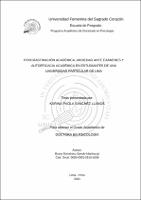Procrastinación académica, ansiedad ante exámenes y autoeficacia académica en estudiantes de una universidad particular de Lima
Abstract
El presente estudio tuvo como finalidad conocer la bondad de ajuste a los datos empíricos del modelo explicativo integrado propuesto, basado en ecuaciones estructurales, para explicar la procrastinación académica asociada a la ansiedad ante exámenes y autoeficacia académica. El diseño de investigación utilizado fue de tipo correlacional multivariado, evaluándose a 205 universitarios limeños de distintas carreras, las edades de los estudiantes fueron desde los 18 hasta los 35 años (Media=21). Se emplearon instrumentos como la Escala de Procrastinación Académica (Domínguez, Villegas y Centeno (2014), el Inventario de Autoevaluación de la Ansiedad ante Exámenes-IDASE (Dominguez-Lara, 2016) y la Escala de autoeficacia percibida en situaciones académicas-EAPESA (Domínguez, Villegas, Mattos & Ramírez, 2012). Los resultados indican una correlación con tamaños del efecto entre pequeños y moderados entre las dimensiones de las variables considerando a la procrastinación académica con bondades de ajuste adecuados hacia la autoeficacia académica y mostrando a la ansiedad ante los exámenes como una variable que no guarda relación directa con las antes mencionadas. Para finalizar, se discutieron el resultado y se proponen nuevas investigaciones. The present study aimed to know the goodness of fit to the empirical data of the proposed integrated explanatory model, based on structural equations, to explain academic procrastination associated with test anxiety and academic self-efficacy. The research design used was of the multivariate correlational type, evaluating 205 Lima university students from different careers, the ages of the students were from 18 to 35 years old (Mean = 21). Instruments such as the Academic Procrastination Scale (Domínguez, Villegas and Centeno (2014), the Self Assessment Inventory of Test Anxiety-IDASE (Dominguez-Lara, 2016) and the Scale of perceived self-efficacy in academic situations-EAPESA (Domínguez , Villegas, Mattos & Ramírez, 2012) The results indicate a correlation with effect sizes between small and moderate between the dimensions of the variables, considering academic procrastination with adequate adjustment benefits towards academic self-efficacy and showing anxiety before students. examinations as a variable that is not directly related to the aforementioned variables Finally, the result was discussed and new investigations were proposed.
Description
Tesis


